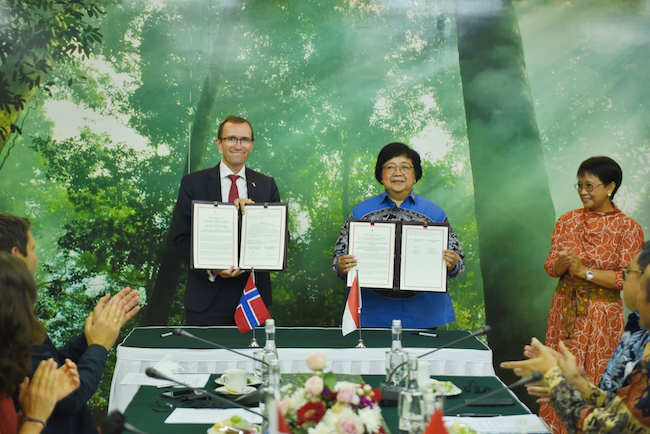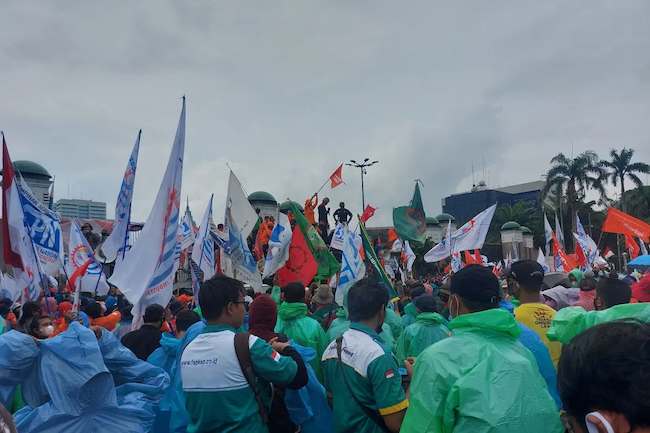Voluntary Carbon Market (VCM) promises private participation towards a net sink future, but not a fire-proof one
Muhammad Soufi Cahya Gemilang
On 24 December 2023, Sri Mulyani, the Indonesian minister of finance looked optimistic. In her address to the high-level round table on the Voluntary Carbon Market (VCM) initiated by the COP28 Presidency and the Glasgow Financial Alliance for Net Zero (GFANZ), she conveyed that Indonesia had successfully contributed 15 per cent of the total Asian VCM. With a carbon offsetting transaction value amounting up to US$163 million for the period 2016 to 2020, and with 464,843 tonnes of CO2 sold at the Indonesian Carbon Exchange, she declared that the carbon market ‘shows a promising future potential.’
The Indonesian government paved the way for the VCM in 2021 with the introduction of Presidential Regulation No. 98/2021 on Carbon Pricing. The new regulation designates carbon pricing (Nilai Ekonomi Karbon/NEK) reduction through private participation as a part of the Indonesian Nationally Determined Contribution (NDC) to reduce its overall greenhouse gas emissions. As the Indonesian government is rushing to achieve its net-zero sink goal by 2030, the law provides a legal framework and governing mechanism to spearhead the private sector’s involvement in growing the domestic carbon market.
These developments in Indonesia are part of a burgeoning global carbon market. The Kyoto Protocol of 1997 paved the way for the private sector to offset their carbon emission by investing in projects for emission reduction. In recent years, support for decarbonisation and corporate accountability in climate change led to a surge in carbon offsetting projects. With aims to reduce, avoid or lower carbon emissions, these projects often materialised in the form of renewable energy plants and forest conservation projects.
Promises abound, yet complex challenges often beset these projects. Scientists and campaigners have serious concerns about the projects’ efficacy in delivering on the promise to sequester carbon and limit emission rates, deeming such promises as both an overstatement and providing a license to pollute. Ethically, these projects are also under fire as they foster massive forest land grabs as conservation sites for carbon offsetting, specifically in Global South countries.
Ambitious targets
Fire defies territorial boundaries and regulations, and it poses a significant threat to the operationalisation and promises of carbon-offsetting projects. Fire outside a certain conservation area may jeopardise carbon reduction targets and potentially lead to higher emissions. Managing fire hazards requires more than a single territory-based approach, however until now it remains the case that national policies and approaches in fire management present challenges for ambitious carbon offsetting endeavours.
Having ratified Law No. 17 on the Ratification of the Kyoto Protocol in 1997, Indonesia has been a major player in the emerging global carbon market. The Conference of Parties (COP) 13 held in Bali in December 2007 put the Reduced Emissions from Deforestation and Degradation (REDD) into the spotlight by delivering the Bali Action Plan to implement the REDD approach in developing countries, later known as REDD+.

From 2007 to 2012 the Indonesian government developed a multifaceted approach to set up the required operations, financing mechanisms, scientific data, and institutional support for REDD+. Multiple attempts to implement REDD+ have since been developed ranging from the Indonesia-Norway REDD+ Partnership to the Katingan-Mentaya REDD+ developed by PT Rimba Makmur Utama, a private ecosystem service provider. Currently, Indonesia provides 9.2m offset credits, the highest in the world, with the largest single carbon provider being the Katingan-Mentaya peatland project in Central Kalimantan. A legal provision brought by the 2021 Presidential Regulation on Carbon Pricing coupled with the inclusion of the carbon market as part of the NDC, further promotes private participation in emerging carbon solutions like this one.
Shortcomings and contradictions
The promise of a net zero future may, however, contradict the reality in the field. Fire remains a looming threat to the growing carbon market. In the Ministry of Environment and Forestry Operational Plan for FOLU Net Sink 2030, the government implemented both preventative and curative measures to manage fire threats from designated conservation zones. Preventative measures are conducted by mobilising state apparatus through increased patrols and community-led organisations such as the Fire Care Community (Masyarakat Peduli Api) and community-based peatland conservation and restoration (Desa Mandiri Peduli Gambut). The local authorities in Central Kalimantan adopted Indonesia FOLU Net Sink Workplan and established punitive measures, as mentioned in the Joint Declaration between the Ministry of Environment and the National Police.
Despite its well-intentioned plans and motivations, researchers have pointed out the state’s bias against slash-and-burn farmers in fire management. In the Central Kalimantan peatlands, the state often deploys harsh regulations against slash-and-burn farmers; many smallholders and indigenous farmers who used fire as part of their land-clearing methods were often blamed as the primary drivers of forest fire incidents and criminalised despite little evidence of their role in landscape peat fires. Although the slash-and-burn practice seems to be environmentally questionable, it replaces the use of herbicides and returns necessary minerals to rejuvenate the land. Indigenous communities, however, frequently receive a certain level of leniency, but a full ban is in place for others. The harsh mechanism did not always deter small farmers from burning. Others were more guarded and moved to put out fires that spread to their land as they were afraid of being accused of spreading the fire in the first place. This same mechanism will be used for future VCM projects, and it will marginalise small farmers further in their quest to control fires.
Community-led efforts also reek of insufficiency in dealing with fire. Most of the established REDD+ programs have failed to control deforestation due to their focus on communal economic development programs and less on deforestation programs. Other community-based programs to manage fire failed due to lack of funding and complex bureaucratic demands for peat rewetting infrastructure, which shift the burdens of fire management to the local people. These factors have led to many of the community-led initiatives for fire control being abandoned by the said communities.
Burning issues
Along with tough law enforcement and community-based fire management, the change in legal landscape also influences fire management and its policies in Indonesia. In 2020, the Indonesian government passed Law No. 11 of 2020 on Job Creation, also known as the Omnibus Law (“UU Ciptaker”), that includes reforms in the environmental impact analysis (EIA) process. The mechanism has been simplified so that it is based on the risk assessment of each business and centralised, so that decisions related to spatial planning are now made at the central government level. The government argued that simplification and centralisation is a progressive mean to increase foreign investment and follow the lead of other nations in environmental risk-based approach assessment.
In the context of Indonesia’s ambitious net-zero ambition, UU Ciptaker and its subsequent implementations proved to be somewhat ironic. Normatively, UU Ciptaker and its subsidiary regulations paved the way for increased risk of forest overexploitation and environmental degradation. This came about as a consequence of reduced community involvement in the EIA process and legal flexibility for further forest-destructive activities.

Normative legal flexibilities aside, corporate impunities will be a significant obstacle to fire management. This is most apparent in the case of oil palm plantation companies, where officials’ collusion and village depoliticisation has seen corporate palm oil actors frequently enjoy impunity. In the context of fire management, corporate impunity would exacerbate fire hazards, especially in peatland areas. Palm oil and pulpwood companies operating in peatland areas, constructed canals that drained the peat areas. Despite obligations to rewet the peat areas, up to 2 million hectares of drained peatland remains unrestored. As fire knows no territorial boundaries, fire hazards from corporate wrongdoing and relaxed regulations will not only affect the corporate concession but also neighbouring carbon conservation areas.
Hazy futures
As VCM is promoted as a tool for enhancing Indonesia’s net zero targets, the governance mechanism for its implementation remains a challenge. Using an Indonesian proverb ‘sharp downwards, blunt upwards,’ the current mechanisms for carbon restoration projects rely on harsh punishments toward small farmers who used fire for their livelihood, while going soft on corporates' non-compliance. Simultaneously, mechanisms to safeguard fire end up burdening villagers and small farmers who are left without adequate resources.
If the government insists on reapplying similar mechanisms for future VCM projects, then one cannot expect any better results. Apart from a greater risk of fire coming from large-scale peat drainage projects compared to small farming fires, the current governance mechanism may lead to failures in achieving VCM goals and lose the investors. Despite their clear promises, a hazy future still looms over ambitious carbon through Indonesia’s voluntary carbon markets.
Muhammad Soufi Cahya Gemilang (mzcahyagemilang@gmail.com) is a Research Associate at the Centre for Anthropological Research (PUSKA) Universitas Indonesia.












